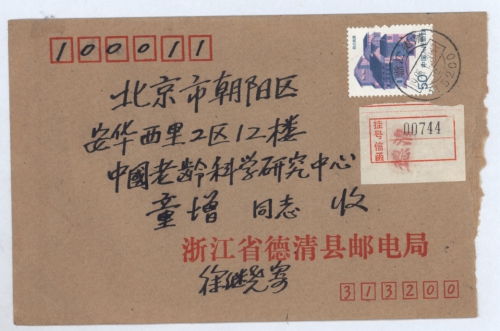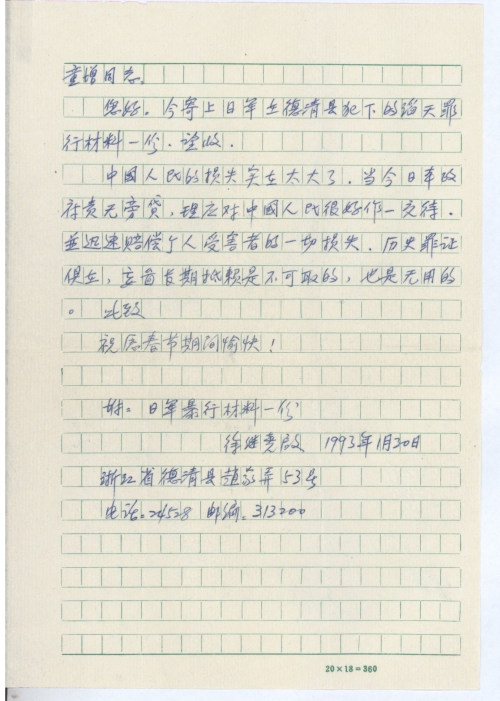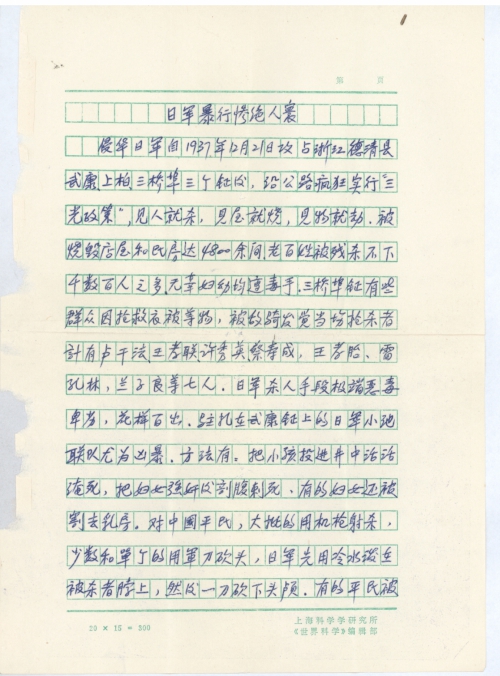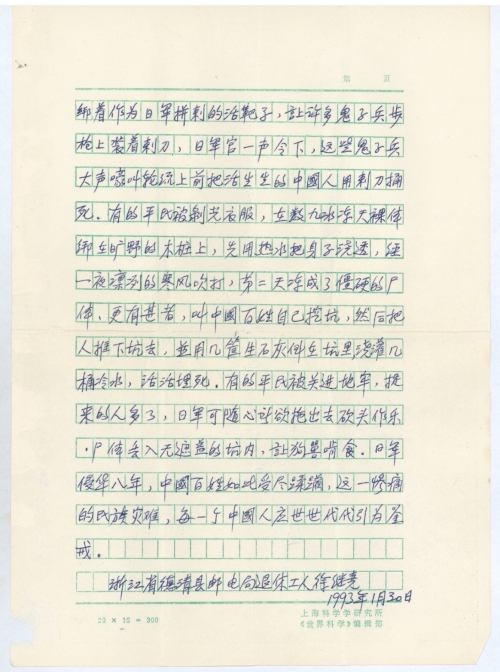Date of letter:1993-01-30
Address of author:Deqing County, Huzhou City, Zhejiang Province
Date of event:1937
Location of event:Deqing County, Huzhou City, Zhejiang Province
Name of author:Xu Jiyao
Name(s) of victim(s):Common people in Deqing County
Type of atrocity:Others, Rapes(RA, OT)
Other details:Mailed a material for revealing the Japanese Army’s atrocities, and give detailed explanations on facts of Japanese invaders’ intrusion into Deqing County.
Comrade Tong Zeng:
Hello!
Today I mail you a document about the towering crimes committed by the Japanese Army in Deqing County. Please keep it.
The loss suffered by the Chinese people is really too enormous. The Japanese government today has the bounden duty to give satisfactory settlement to the Chinese people, and immediately compensate for all losses sustained by individual victims. The historical crime evidences are all there, it is inadvisable and also useless in trying to evade the issue for as long as possible.
Regards
Wish you a Happy New Year!
Enclosed: Document on atrocities of the Japanese Army
Xu Jiyao
January 30, 1993
53 Zhaojia Lane, Deqing County, Zhejiang Province
Tel: 24528 Postal code: 313200
Extremely Cruel Atrocities of the Japanese Army
After the Japanese Invasion Army occupied three towns of Wukang, Shangbai, and Sanqiaobu in Deqing County, Zhejiang Province, on December 21, 1937, they traveled along the highway to frantically implement “Burn All, Kill All, Loot All” policy, killed whomever they met, burned whichever house they passed, and looted whatever valuables they saw, the number of shops and houses being burned was up to over 4800. More than one thousand and several hundred civilians were killed. All innocent women and children met with disastrous end. Some residents in Sanqiaobu Town were discovered by the enemy’s cavalry troop and killed on the spot when salvaging clothing and quilt from fire, including seven persons of Lu Ganfa, Wang Xiaolian, Xu Xiuying, Cai Shoucheng, Wang Xiaoyi, Lei Konglin, and Lan Ziliang. The Japanese Army’s killing methods were diversified, and extremely vicious and despicable. The Japanese Army’s Koike Joint Force stationed at Wukang Town was particularly ferocious. The killing methods included: Drowning babies by tossing them into well, raping women before killing them by stabbing the belly, some women’s breasts were cut off. For large crowd of civilians, they used machine guns, for a few or single individuals, they decapitated them with military sword, the Japanese soldiers first splashed cold water on the necks of the victims, then cut off the head in one swoop with knife. Some civilians were tied up as living target of the Japanese Army, many Japanese soldiers fixed bayonets on the tip of rifles, the Japanese officer issued an order, these Japanese soldiers howled and in turn came forward to stab living Chinese to death. Some civilians were stripped naked, and tied on wooden stakes in freezing winter days, first they soaked their bodies with hot water, after one night of exposure to chilly wind, on the second day they were frozen into rigid dead bodies; what’s more, they asked Chinese civilians to dig a pit, then pushed them down into the pit, then threw in several basketful of quicklime into the pit, followed by several buckets of cold water to bury them alive. Some civilians were imprisoned in dungeon, when there were many prisoners as time passed, the Japanese Army would drag someone out to decapitate as they wished at any time for fun, the bodies were thrown into uncovered pit to allow eating by dogs or other beasts. During eight years of invasion by the Japanese Army, Chinese civilians received such ravage, this bitterly painful national calamity deserves to be remembered and drawn a lessen from by every Chinese from one generation to the next generation.
Xu Jiyao
Retired worker of Zheijiang Province Deqing County Post & Telecommunication Office
January 30, 1993

















